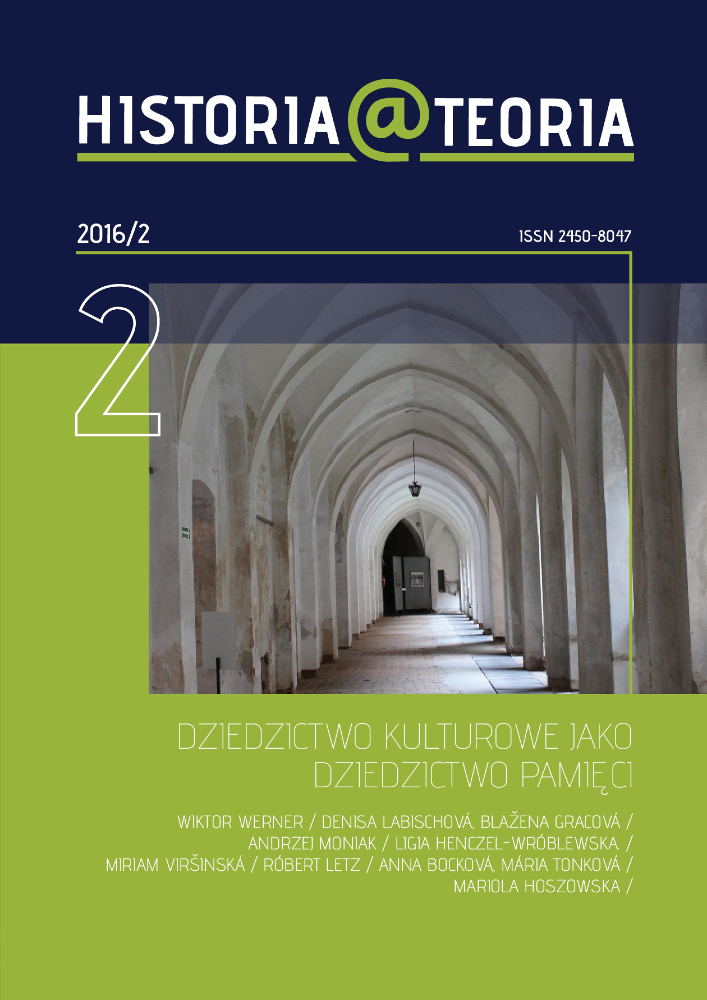Abstrakt
October 28, 1918 represents one of the most important milestones of the Czech collective memory. Th e aim of the study is to capture the main traits of the explanatory refl ection of the events related to the formation of the fi rst Czechoslovak Republic in history textbooks of the selected neighbouring countries (Poland, Slovakia, Austria, and Hungary as a “historical neighbour”) and to compare them with the Czech approach, as well as mutually with each other focusing on the characteristics of educational texts which are typical for historical narration in each of the given countries. We focused in particular on the secondary school textbooks and a specifi c interpretation of the concrete themes which are accentuated in the national explanatory texts, on the one hand, or suppressed, on the other. Th e content analysis shows that there is an apparent eff ort for an objective approach, however, we can fi nd there also stereotypical views which the authors of textbooks oft en repeatedly adopt or derive from the same specialized publications. Th e objectivity of their elaboration could be achieved by the elimination of inaccuracies, the simplifying characteristics leaving aside some essential facets of the problem and by overcoming a one-sided view focused only on one situation or event and neglecting other essential historical information.Bibliografia
Absenger A., Der Mensch im Wandel der Zeiten 1, Wien 1999.
Bartlová A., Letz R., Dejepis. Národné dejiny. Pre 3. ročník gymnázií, Bratislava 2005
Brzozowski A, Szczepański G., Ku współczesności. Dzieje najnowsze 1918-2006. Podręcznik do historii dla klasy I liceum i technikum – zakres podstawowy, Warszawa 2012
Dolecki R., Gutowski K., Smoleński J., Po prostu historia. Szkoły ponadgimnazjalne, zakres podstawowy, Warszawa 2012.
Eigner E. et al., Zeitzeichen Geschichte und Kultur II WB, Linz 2002
Gavora P., Úvod do pedagogického výzkumu, Brno 2000,
Gracová B., Vědomosti a postoje české a polské studující mládeže, Ostrava 2004.
Gracová B., “První republika v učebnicích našich sousedů”, Historica, 2005. č. 12, s. 299−312;
Gracová B., “Češi a Poláci ve 20. století − obraz souseda na stránkách polských a českých dějepisných učebnic”, in: Vzájemný obraz souseda v polských a českých školních učebnicích, ed. B. Gracová,
D. Labischová, J. Szymeczek, Ostrava 2014, p. 25-39.
Hofer J., Paireder B., Netzwerk Geschichte@Politik 3. Geschichte und Sozialkunde/Politische Bildung,
Lehr- und Arbeitsbuch für die 7. Schulstufe, Linz 2013
Hueber G., Shröckenfuchs E., Einst und heute 7, Wien 2001.
Kodajová D., Tonková D., Dejepis. Svetové dejiny. Pre 3. ročník gymnázií, Bratislava 2006
Kováč D. et al., Dějepis 4. Slovensko v novom storočí, Bratislava 1997,
Kováč D. , Kratochvíl V., Kamenec I., Dejepis pre 9. ročník ZŠ, Bratislava 2012. 53
Kvaček R., “Ke vzniku Československa”, Český časopis historický, 1998, roč. 96, č. 4, p. 717−735;
Labischová D., Čech závistivec – Rakušan byrokrat? Proměny obrazu Čechů, Rakušanů a jejich minulosti ve vědomí studující mládeže, Ostrava 2005.
Labischová D., Co si uchováme v paměti? Empirický výzkum historického vědomí, Ostrava 2013.
Letz R., Tonková M., Bocková A., Dejopis pre 3. ročnik gymnázii a atrednych škôl, Bratislava 2013
Pfeiferová Š., Šubrt J., “Veřejné mínění o problematice českých dějin”, Naše společnost, 2009, č. 2,p. 16 -23;
Pokorny, Lemberger, Lobner, Durch die Vergangenheit zur Gegenwart 7, Linz 2002.
Průcha J., Učebnice: Teorie a analýzy edukačního média, Praha 1998.
Radziwiłł A., Roszkowski W., Historia 1871-1939. Podręcznik dla szkół średnich, Warszawa 1998
Roszak S., Kłaczków J., Poznać przeszłość. Wiek XX. Nowa era, Warszawa 2011.
Salamon K., Dejepis pre IV. ročník gymnázií, Budapest 1995.
Schindlbauer M., Kröter G., Th ema: Geschichte. 7. Klasse. Vom 20. zum 21. Jahrhundert, Wien 2007
Stradling R., Multiperspektivita ve vyučování dějepisu: příručka pro učitele, Rada Evropy 2003, český překlad Praha 2004.
Száray M., Kaposi J., Dejepis 12 pre gymnáziá, Budapešť 2007.
Szelągowska G., Ludzie − społeczeństwa − cywilizacje. Historia IX i XX wieku. Część III. Podręcznik dla liceum ogólnokształcącego, liceum profilowanego i technikum, Warszawa 2002
Šubrt, J. Vinopal, “K otázce historického vědomí obyvatel České republiky”, Naše společnost, 2010, č. 1, p. 9-20.
Licencja
Autorzy
Autorzy tekstów przyjętych do publikacji w czasopiśmie Historia@Teoria są zobowiązani do wypełnienia, podpisania i odesłania na adres redakcji umowy o udzielenie nieodpłatnej licencji do utworów, z zobowiązaniem do udzielania sublicencji CC.
Zgodnie z umową, autorzy tekstów opublikowanych w czasopiśmie Historia@Teoria udzielają Uniwersytetowi im. Adama Mickiewicza w Poznaniu niewyłącznej i nieodpłatnej licencji oraz zezwalą na użycie sublicencji Creative Commons Attribution-NoDerivatives 4.0 International (CC BY-ND 4.0).
Autorzy zachowują prawa do dalszego, swobodnego rozporządzania utworem.
Użytkownicy
Zainteresowani użytkownicy internetu uprawnieni są do korzystania z utworów opublikowanych od 2015 roku w Historia@Teoria pod następującymi warunkami:
- uznanie autorstwa - obowiązek podania wraz z rozpowszechnionym utworem, informacji, o autorstwie, tytule, źródle (odnośniki do oryginalnego utworu, DOI) oraz samej licencji;
- bez tworzenia utworów zależnych - utwór musi być zachowany w oryginalnej postaci, nie można bez zgody twórcy rozpowszechniać np. tłumaczeń, opracowań.
Inne
Uniwersytet im. Adama Mickiewicza w Poznaniu zachowuje prawo do czasopisma jako całości (układ, forma graficzna, tytuł, projekt okładki, logo itp.).
